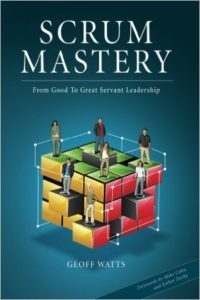“Scrum has been a big disappointment; a failed experiment that hasn’t delivered anywhere near the positive impact that management was hoping for.”

Not the most uplifting quote, but Geoff Watts (@geoffcwatts) starts his book, Scrum Mastery: From Good to Great Servant Leadership, by telling you exactly how he sees it. Geoff also tells you that while the first experience is common in the Agile and Scrum world, he has also seen the power of self-organizing teams and the positive impact for good that Scrum can make. So what differentiates the two experiences in his eyes? Effective Servant Leadership.
The central metaphor of this book is the idea that ScrumMasters need to be RE-TRAINED in order to excel as ScrumMasters and Servant-Leaders. RE-TRAINED is an acronym that stands for the following nine concepts (see below) that Geoff explores in greater depth throughout the book. In addition, Geoff shares many excellent stories about these concepts in action and gives specific activities ScrumMasters can do to increase their impact.
- Respected: have a reputation of personal integrity within and outside the Team.
- Enabling: passionate in helping others be effective.
- Tactful: the personification of diplomacy.
- Resourceful: creative in removing impediments to productivity.
- Alternative: promote ideas and practices that might be considered counter-cultural.
- Inspiring: generate enthusiasm and energy in those around them.
- Nurturing: enjoy helping both teams and individuals grow.
- Empathetic: sensitive to the human needs of those around them.
- Disruptive: break the old status quo to help create new ways of working.
Geoff begins his exploration with the idea of being respected. Being respected has two important qualities: humility and personal integrity. Humility is the idea that a person acts selflessly and free of ego while integrity means to act honestly, consistently, reliably and from a strong moral code. When both of these traits combine, the ScrumMaster’s view, opinions and ideas have greater weight with those who have influence in the organization.
So what do ScrumMasters do to gain the respect of others? They ask the Team. Whenever any decision needs to be made, the ScrumMaster simply asks the Team what they think is the right response. This simple act is probably the most important action of a ScrumMaster. When people see that the default position of a ScrumMaster is to ask the Team, they see the ScrumMaster respects their work, their judgement and each one of them as individuals.
In the section in the book of being tactful, Geoff shares two important concepts: creating a sense of safety and the power of silence. Sense of safety is critical for any team and the ScrumMaster is responsible for promoting safety in Scrum. Google’s research in teams, Project Aristotle, showed that when people take turns speaking, demonstrate empathy and bring their entire person to work, a sense of safety can flourish. Joshua Kerievsky (@JoshuaKerievsky) from Industrial Logic has been emphasizing making safety a prerequisite when discussing Modern Agile. Make safety a priority or you get NONE of the benefits of Scrum.
The power of silence means the ScrumMaster tends to be quiet more than they talk. When the ScrumMaster asks the Team, they need to be still. The ScrumMaster’s stillness allows the Team to carefully and thoughtfully consider their response. Sometimes the ScrumMaster may have to be quiet for ten to fifteen seconds before someone on the Team will break the silence. Eventually someone on the Team will speak up.
Being resourceful means the ScrumMaster is the embodiment of the “The Art of the Possible“. The ScrumMaster assumes a solution is possible and takes steps in the direction of that solution. Along the way towards the goal, the ScrumMaster leverages people within their personal network to discover who can help them or who has spare resources at their disposal. Resourceful ScrumMasters encourage people to share their creative ideas, look for ways to make work more fun and break up the monotony when Scrum feels repetitive.
To be alternative, means to bring in new ideas and techniques with the goal of fostering long-term growth and improvement with the Team and the business. Being alternative is about adding to the Team – ideas, practices or concepts they would not consider on their own – with the intention to expand their impact.
When the ScrumMaster is disruptive, they are specifically challenging the status quo. Sometimes, this means to be the one person who has the courage to say, “No, I don’t think that decision is wise nor the right thing to do.” Of course, to be disruptive requires one to be tactful and respected. To be disruptive is about breaking down a constraint that is holding back the growth of individuals, teams or the organization.
Finally, a ScrumMaster needs to be inspiring. The very best ScrumMasters are positive and optimistic. Because they operate from a strong moral center, they are courageous in their convictions and truly believe each person can achieve better. Most importantly, the ScrumMaster takes time to discover what motivate others, i.e. what is their animating purpose in life and works, and looks for opportunities to act on their purpose in their career.
*Written by Joshua Kerievsky




